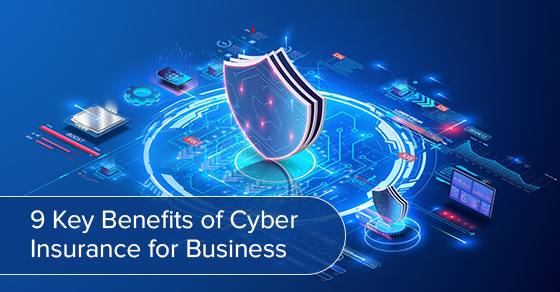
9 Key Benefits of Cyber Insurance for Business
Is your business protected from cybercrime? If not, you may want to consider investing in cyber insurance. Cyber attacks, such as data breaches and hacks, may result in significant damage. Businesses must cope with company failures, lost income, and litigation. It’s critical to remember that no business is immune to the consequences of cybercrime.
As a consequence, cyber liability insurance has emerged as an important element of any risk management strategy. Cyber insurance can provide a number of key benefits for businesses of all sizes, including protection against data breaches, financial losses, and lawsuits. Here are seven reasons why cyber insurance should be a top priority for your business:
1. Covers breach of data
The cost of a data breach is high and can be avoided with proper prevention methods. Organizations must notify their customers in case they are impacted by the incident, including security fixes that may arise from it as well legal action against them if applicable under law. Cyber liability policies also include coverage for these types of risks so you don’t have to worry about safeguarding your personal information online.
2. Business loss reimbursement
Your business may suffer from a loss of income if it’s the victim of a cyber attack. This type of coverage can help reimburse you for lost revenue and extra expenses incurred as a result of the incident. It can also cover the cost of hiring a public relations firm to manage your reputation in the aftermath of an attack.
Cyber-attacks can have a significant impact on an organization’s ability to conduct business operations. If you suffer from these interruptions, it is essential that your company be fully covered for any losses incurred as well as increased expenses following a cyber attack with liability policies typically covering both time lost and income missed during downtime due completely or partially caused by a cyber attack on your business.
3. Forensic support and investigation
In the event of a data breach, you’ll need to hire a forensic specialist to help you determine how the attack occurred and what data was compromised. This type of support can be expensive, but it’s critical to understand the full extent of the damage and ensure that your business is protected in the future. Cyber insurance can help cover these costs so you can focus on getting your business back up and running.
4. Legal support and defence
If your business is sued as a result of a data breach, you’ll need to hire an attorney to defend you in court which in most cases can be a very costly and time-consuming process. Cyber insurance can help cover the cost of legal fees and any settlements or judgments that may be awarded against your business.
5. Reputation management
A data breach can damage your company’s reputation, even if you’re not at fault. You may need to hire a public relations firm to help you manage the fallout from the incident. In addition, you may need to offer free credit monitoring or other services to your customers to help restore their trust.
No client or customer has an interest in doing business with an organization that may put their own data in jeopardy. Cyber insurance can help cover these costs so you can focus on protecting your business’s good name and maintaining a trustworthy reputation.
6. Cyber extortion defence
The number of cyber attacks is on the rise. As these types become more severe and frequent, it’s important to have liability insurance that will help cover any losses you may incur from ransomware or similar malware-enabled extortions.
In most instances, cybercriminals may try to extort money from your business by threatening to release sensitive data or launch a denial-of-service attack. Cyber insurance can help cover the cost of meeting their demands and any damages that may result from the incident.
7. Beyond General Liability coverage
Most general liability insurance policies exclude cyber-related risks, so it’s important to have a separate policy in place specifically for these types of exposures. Cyber insurance can provide coverage for a wide range of risks, including data breaches, cyber-attacks, cyber extortion, and more.
Cyber insurance is an essential part of any risk management strategy. By protecting your business from the financial costs associated with data breaches, cyber-attacks, and other online threats, you can focus on running your business without worrying about the potential consequences of a digital incident.
8. Lost devices coverage
With the rise in mobile devices, it’s more important than ever to make sure your business is protected in the event that a device is lost or stolen within your business. Lost devices such as laptops that contain important data can put your business at risk if found in the wrong hands.
When you’re faced with the prospect of a data breach, it’s important to know your options for protecting yourself. One way is by purchasing Cyber Policy Insurance that will cover any costs associated if there are unauthorized accesses or uses made from private information and not just device replacement.
9. Regulatory fines and penalties coverage
As data privacy and security regulations continue to evolve, the risk of non-compliance is increasing. If your business is found to be in violation of these regulations, you could be subject to heavy fines and penalties. Cyber insurance can help cover the cost of these fines and penalties, as well as the cost of complying with new regulations.
Get Reliable Coverage from Oegema Nicholson Insurance Today
Cyber insurance is an essential part of any business risk management strategy. Protecting your business from the financial costs associated with data breaches, cyber-attacks, and other cyber insurance can help cover the cost of data recovery, as well as any legal fees associated with a data breach.
Contact Oegema Nicholson Insurance today directly at (613)-704-7766 for more information about our policies or request a quote online today.

